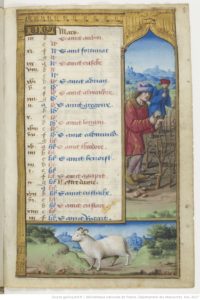
“March”, kalendar page from Les Petites Heures d’Anne de Bretagne (The Little Hours of Queen Anne of Bretagne), by the Maître des Triomphes de Pétrarque. From Bibliothèque nationale de France, Paris (France).
Thomas’s path to the church was a bit circuitous. Born to a prominent family in Aquino (then part of the Kingdom of Sicily), Thomas was expected to follow his uncle Sinibald into the Benedictine order. Sinibald was abbot of the first Benedictine monastery at Monte Cassino, and the priesthood was a normal career path for younger sons. But at nineteen, Thomas decided to join the recently founded Dominican Order. His family objected, and they kidnapped him while the Dominicans were trying to spirit Thomas to Rome and thence to Paris. Eventually his mother Theodora arranged for Thomas to “escape” at night through a window, in order to save the family’s dignity. Apparently, a secret escape was less embarrassing than the family’s capitulation to the Dominicans.
Supernatural events have been attributed to Thomas. On one occasion, as Thomas remained in chapel after Mattins, the sacristan witnessed Thomas levitating in prayer before an icon of the crucified Christ. According to the record, Christ said to Thomas, “You have written well of me, Thomas. What reward would you have for your labor?” Thomas responded, “Nothing but you, Lord.” Later the same year, Thomas experienced an extended ecstasy while celebrating Mass, and the experience so moved the saint that he ceased work on the Summa Theologica, which remained unfinished. Thomas died three months later.
Thomas’s feast day is March 7, the day of his death. But because this date often falls within Lent, the 1969 revision of the General Roman Calendar moved his feast to January 28, the date of the translation of his relics to Church of the Jacobins in Toulouse.


